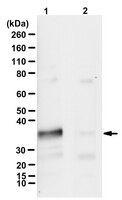ABF998-25UL Sigma-AldrichAnti-IspH
Anti-IspH, Cat. No. ABF998, is a rabbit polyclonal antibody that detects 4-hydroxy-3-methylbut-2-enyl diphosphate reductase (IspH) and is tested for use in ELISA and Western Blotting.
More>> Anti-IspH, Cat. No. ABF998, is a rabbit polyclonal antibody that detects 4-hydroxy-3-methylbut-2-enyl diphosphate reductase (IspH) and is tested for use in ELISA and Western Blotting. Less<<Recommended Products
Overview
| Replacement Information |
|---|
| References |
|---|
| Product Information | |
|---|---|
| Format | Purified |
| Presentation | Purified rabbit polyclonal antibody in PBS with 0.02% sodium azide. |
| Quality Level | MQ200 |
| Physicochemical Information |
|---|
| Dimensions |
|---|
| Materials Information |
|---|
| Toxicological Information |
|---|
| Safety Information according to GHS |
|---|
| Safety Information |
|---|
| Storage and Shipping Information | |
|---|---|
| Storage Conditions | Recommend storage at +2°C to +8°C. For long term storage antibodies can be kept at -20°C. Avoid repeated freeze-thaws. |
| Packaging Information | |
|---|---|
| Material Size | 25 µL |
| Transport Information |
|---|
| Supplemental Information |
|---|
| Specifications |
|---|
| Global Trade Item Number | |
|---|---|
| Catalogue Number | GTIN |
| ABF998-25UL | 04065267216690 |
Documentation
Anti-IspH SDS
| Title |
|---|
Anti-IspH Certificates of Analysis
| Title | Lot Number |
|---|---|
| Anti-IspH - Q3764854 | Q3764854 |







